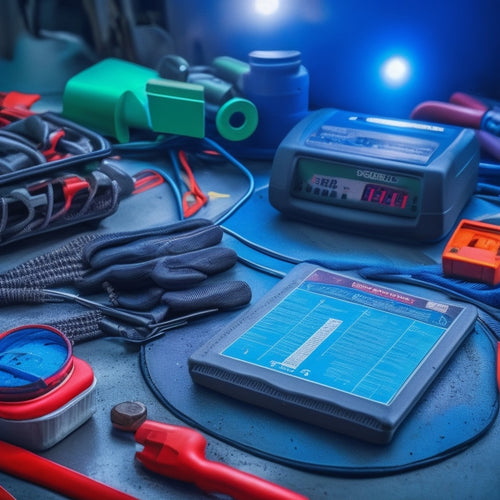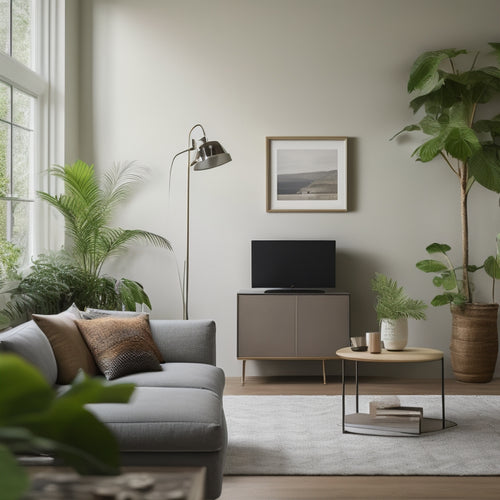
Organizing Your Home the Solar Way: Eco-Friendly Solutions
Share
You're about to transform your home into a serene and sustainable oasis by embracing the power of solar-inspired organizing, where every decision is driven by a passion for the planet and a desire for clutter-free living. Start by decluttering with a mindful approach, considering the emotional and physical impact of each item. Then, maximize natural light by strategically placing mirrors and utilizing eco-friendly storage solutions. Repurpose old items to reduce waste, and switch to solar-powered cleaning essentials for a healthier space. As you continue on this journey, you'll uncover even more innovative ways to harmonize your home with nature.
Key Takeaways
• Adopt an eco-friendly approach to decluttering by recognizing physical and emotional clutter and letting go of items that don't bring joy or serve a purpose.
• Maximize natural light by strategically placing mirrors, using light-colored window treatments, and amplifying sunlight with reflective surfaces.
• Opt for sustainable storage solutions like eco-friendly shelving units, reusable storage bins, and shelf dividers made from reclaimed or recycled materials.
• Repurpose old items to reduce waste, such as using old pallets for furniture or turning old t-shirts into reusable bags.
• Switch to solar-powered cleaning essentials, eco-friendly products, and refillable containers to reduce waste and toxins in your home.
Decluttering With a Solar Twist
As you begin your solar-powered organizing journey, start by tackling the most overwhelming task: decluttering, but this time, with a solar twist that harnesses the natural energy of the sun to inspire a more mindful approach.
With a Solar Focus, you'll approach decluttering as an opportunity to reconnect with nature and yourself. This shift in mindset helps you recognize that clutter isn't just physical, but also emotional. By acknowledging your Clutter Mindset, you'll be more intentional about what you keep and what you let go of.
As you sort through your belongings, ask yourself: 'Does this item bring me joy and serve a purpose?' Let the sun's energy guide you towards a more thoughtful and eco-friendly approach to decluttering, and watch your space transform into a haven of serenity and sustainability.
Harnessing Natural Light Effectively
By strategically placing mirrors and reflective surfaces, you can maximize the natural light pouring in through your windows and make your space feel brighter, airier, and more connected to the outdoors. Consider the window placement in your home and how you can use it to your advantage.
For example, placing mirrors opposite windows can amplify the natural light and create the illusion of larger windows. Additionally, use light-colored window treatments to reflect light and make the most of the sun's rays.
Sustainable Storage Solutions Found
As you're organizing your home the solar way, you're probably thinking about how to store your belongings sustainably.
You're in luck because there are some fantastic eco-friendly storage solutions out there that can help you reduce your environmental footprint.
From eco-friendly shelving units to reusable storage bins and sustainable shelf dividers, you'll find a solution that fits your needs and aligns with your values.
Eco-Friendly Shelving Units
You'll be delighted to discover that eco-friendly shelving units can be both stylish and sustainable, providing a guilt-free way to organize your belongings while also reducing your carbon footprint.
Bamboo benefits are numerous, and using it for shelving units is an excellent way to reap them. Bamboo is highly renewable, durable, and requires minimal resources to harvest.
Alternatively, consider shelving units made from recycled materials, which reduce waste and conserve natural resources. Look for units with a high recycled content or those made from reclaimed wood.
Reusable Storage Bins
More than 10 million tons of plastic storage bins end up in landfills each year, making reusable storage bins an essential step towards reducing waste and creating a more sustainable home.
By incorporating reusable storage bins into your home organization system, you'll not only reduce your environmental footprint but also create a more organized and clutter-free space.
To maximize the effectiveness of your reusable bins, implement a labeling system that clearly identifies what's inside each bin. This will help you quickly find what you need and maintain your bin organization.
Consider using bins made from sustainable materials like bamboo or recycled plastic to further reduce your eco-impact.
With reusable storage bins and a thoughtful labeling system, you'll be well on your way to a more organized, eco-friendly home.
Sustainable Shelf Dividers
Opting for shelf dividers made from sustainable materials like reclaimed wood, bamboo, or recycled cardboard helps to minimize the environmental impact of your storage solutions. By choosing eco-friendly dividers, you're not only reducing waste but also creating a more organized and peaceful space.
Look for products with recognized Eco Labels, such as the Forest Stewardship Council (FSC) certification, to make sure you're getting a genuinely sustainable product. As a bonus, these dividers can also serve as Space Savers, keeping your belongings tidy and easy to find.
With sustainable shelf dividers, you'll be creating a more harmonious and environmentally responsible home.
Repurposing for a Greener Tomorrow
By repurposing items you already own, you're not only reducing waste but also exercising a powerful form of creativity that can have a significant impact on the environment. This creative reuse can breathe new life into old furnishings, giving them a fresh purpose in your organized home. Consider the possibilities:
| Old Item | New Use | Environmental Impact |
|---|---|---|
| Old pallets | Coffee table or shelving | Reduces waste, conserves resources |
| Mason jars | Storage containers | Replaces single-use plastics |
| Old t-shirts | Reusable bags | Reduces textile waste, conserves resources |
| Cardboard boxes | Desk organizers | Reduces paper waste, conserves resources |
Solar-Powered Cleaning Essentials
As you shift to a more sustainable lifestyle, you'll want to swap out harsh chemical-laden cleaning products for eco-friendly, solar-powered cleaning essentials that harness the sun's energy to sanitize and freshen your home.
One innovative solution is the solar mop, which uses UV light to kill bacteria and germs, leaving your floors sparkling clean.
Look for eco-friendly cleaning products that are free from toxins and artificial fragrances, and opt for refillable containers to reduce waste.
Mindful Consumption for a Clutter-Free Home
As you aim for a clutter-free home, it's crucial to be mindful of your consumption habits. You're probably aware that buying impulsively or on a whim can lead to clutter accumulation, so it's time to adopt a more intentional approach.
Buy What You Need
Embracing mindful consumption means adopting a radical shift in your approach to acquiring new possessions, recognizing that every item you bring into your home has a direct impact on your living space and the planet. You're not just buying stuff; you're curating a space that reflects your values and lifestyle.
When you practice intentional buying, you focus on essential purchases that bring value to your life. Ask yourself: Do I really need this? Will it improve my daily life or contribute to clutter? By being mindful of your purchases, you'll reduce waste, save money, and create a more peaceful living environment.
Reduce Unwanted Items
You've likely accumulated items that no longer serve a purpose or align with your values, and it's time to let them go. Reducing unwanted items is important for a clutter-free home. Start by gathering items that are still in good condition and taking them to local donation stations. This won't only declutter your space but also contribute to a more sustainable lifestyle.
Some common items to think about letting go of include:
- Old electronics with broken screens or outdated software
- Clothes that no longer fit or match your personal style
- Books that you've already read or won't read again
- Kitchen gadgets that haven't been used in months
- Broken or damaged items that can't be repaired
Use It Up First
To break the cycle of clutter, start by using up items you already have before buying new ones. Make it a habit to finish that half-empty bottle of cleaning solution or the leftover craft supplies before restocking. This mindful approach will help you avoid duplicating items and reduce waste.
When it comes to food, take a close look at your pantry and fridge to identify what's approaching expiration. Conduct a pantry audit to make sure you're using up older items before they spoil, reducing food waste in the process.
Frequently Asked Questions
Can I Use Solar Power for My Home Security System?
Like a reliable watchdog, you can count on solar power to fuel your home security system, seamlessly integrating wireless cameras and energy efficiency, giving you peace of mind and a clear conscience, while you're in control.
Are Eco-Friendly Cleaning Products Really Effective?
You're wondering if eco-friendly cleaning products really deliver? Absolutely! Green cleaning products, made with natural alternatives, are just as effective as their chemical-laden counterparts, and they're gentler on surfaces and the environment, giving you a cleaner conscience too.
How Do I Dispose of Old Solar Panels Responsibly?
As you begin on a sustainable journey, you'll inevitably face the dilemma of disposing old solar panels. You'll need to navigate Panel Recycling and responsible Waste Management, ensuring a guilt-free goodbye to your trusty panels.
Can I Use Solar Energy to Power My Home Office?
You can definitely power your home office with solar energy! Assess your office layout to optimize energy efficiency, then consider investing in a solar-powered battery storage system to guarantee a seamless workflow.
Are Solar-Powered Water Purification Systems Reliable?
You're wondering if solar-powered water purification systems are dependable? Research shows they can be, but it's important you prioritize regular system maintenance to guarantee consistent water quality, avoiding contamination risks.
Related Posts
-

5 Essential Car Battery Maintenance Tips
You can extend your car battery's lifespan and prevent unexpected breakdowns by following five essential maintenance ...
-

What Does Solar Panel Maintenance Really Cost?
You can expect to pay between $1,500 to $2,500 per year for solar panel maintenance, with costs influenced by your sy...
-

Why Home Battery Deals Are Worth Buying Online
You're buying a home battery deal online for the same reason you wouldn't buy a car without researching online first....


